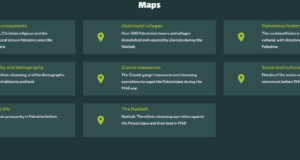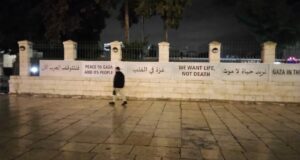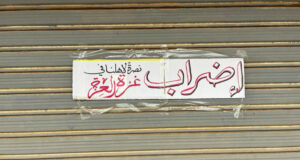by Ellen O’Grady
Since July 26 I have been living in and witnessing the effects of the Israeli military closure on the village of Iraq Bureen and its 900 inhabitants. Iraq Bureen is located three miles outside of the city of Nablus on top of a terraced mountain 880 meters above sea level. Since the outbreak of the Al-Aqsa Intifada and more forcefully since the Israeli invasion into the West Bank, Israel has imposed a closure on Iraq Bureen which impedes movement into and from the village. The closure of the village, which is implemented through military outposts, checkpoints, road blocks, physical barriers, tanks, planes, and helicopters, enables the Israeli army to completely control and restrict movement of people and goods.
The road leading from Iraq Bureen to the surrounding towns and the city of Nablus is closed by a six foot tall rock and dirt barrier constructed by the Israeli army. The road and the surrounding valleys and mountain paths are constantly watched over by an Israeli military camp and military posts on the neighboring mountains. Those who risk breaking the closure by walking around the roadblock or through the valleys risk both being arrested and being shot at. Many take the risk in order to care for and support their families. For example, people break the seige in order to transport food to Nablus for the needed income, to work in neighboring villages for the needed income, to transport water and food and fuel from Nablus to Iraq Bureen, and to go to Nablus to receive medical care.
MEDICAL CARE DENIED
Over 70% of the Palestinian population live in rural areas, such as Iraq Bureen, which do not provide hospital services. Closure therefore severly restricts the population from health care facilities. The inablitity for the people in Iraq Bureen to reach hospitals and clinics has severly affected pregnant women, sick children and people requiring treatment for things such as cancer, kidney failure, and diabetes.
On the night of August 6 Hiyam Q’s baby died while she was in labor in her home. It was a late pregnancy, the baby was very big and could not be delivered vaginally. Had she had access to a hospital a ceasarean section could have been performed and most likely the child’s life would have been saved. (The UNWRA reprts that among its patients there has been a 58% increase in the number of still births since the military closure. Other medical organizations reprt a 100% increase in home deliveries.)
In the past two weeks I have accompanied Palestinians breaking the closure in order to help them reach medical care safely. I have walked with three sick children and their families to reach hospitals and clinics in Nablus. And with Salwa an old woman with sores on her hands and face who is suffering from untreated Diabetes. Doctors at St. Luke’s hospital in Nablus report a 49% decline in general patients, a 73% decline in specialty services, and a 53% decline in surgeries.
KILLED FOR BREAKING THE CLOSURE TO WORK OUTSIDE IRAQ BUREEN: THE STORY OF ADNAN AND MAMOUD
After six months without any work two laborers from Iraq Bureen, Adnan and Mamoud, and a friend and co-worker of theirs from the village of Tell broke the closure to work in a town North of Nablus. They worked for two weeks painting and putting down tile. Before their expected return Adnan called his sister to tell her they would be leaving the next day and be home in two days. The day after the phone call was made the three men were shot and killed by the Israeli Occupation forces in a field in a nearby town. They lay in the feild for two days without being discovered. On the third day the Israeli media reported the killing of the three men, claiming in the report that the three were suspected terrorists, a claim that has no evidence to support it. An ambulance was permitted to reach the three bodies and take them to a hospital in Nablus. The bullet holes were as large as fists suggesting they were fired upon from a plane or tank. Adnan had a large hole through his stomach and eight bullet holes through his right leg. Mamoud had a bullet through his mouth and the top of his head had been cut open. Both of their faces were blue and pocked with gravel from being dragged from the location of the killing. Nothing supports the claim that the men conducted violent activites against Israel. All evidence supports that they were laborers returning from work. I visited and sat with the two families in Iraq Bureen. The family of Mamoud showed me the interior decorating work he had done on their home, including a relief of painted roses on the ceiling and a border of flowers painted on the wall.
The families of Mamoud and Adnan fear that the Israeli military will soon come to destroy their homes. Since 1967, the Israeli authorities have partially or wholly demolished close to 10,000 Palestinian homes. Often these house demolitions are used as punitive measures (e.g., against the families of suspected terrorists). Nearly every day in the past week we have heard the explosions and demolitions of homes in Nablus and the village of Tell. There has been increased tank activity around Iraq Bureen; people here fear there homes will be next.
AGRICULTURE UNDER SEIGE
The majority of the people in Iraq Bureen depend on the sale of cactus fruit, milk and yogurt to support their families. These past eleven days the cactus fruit should have gone to markets in Nablus. Because of the closure and a strict curfew on Nablus there has not been access to markets and much of the fruit is beginning to rot. The small amount of fruit that has reached Nablus has been carried in buckets by farmers and their donkeys who were able to evade the military blockade. This is getting more and more difficult as the presence of tanks and military blockades around Iraq Bureen and Nablus has increased over the past two weeks.
I have spoken with nine farmers who had been trying to get to Nablus with their cactus fruit this past week and who had been stopped by Israeli soldiers and forced to sit with their faces bowed down to the ground for more than four hours in the hot sun and never permitted to sell their fruit.
I have spoken with seven farmers who in the past four weeks have been detained by the Israeli occupation forces for attempting to transport milk, yogurt and fruit to Nablus. Two of those detained, Mohamed and Said, brought me to the place they had been taken by the Isreali soldiers and showed me the broken glass yogurt jars that had been thrown to the ground and broken by the soldiers who had detained them.
From the top of Iraq Bureen I have watched tanks stop and turn back farmers and their donkeys on the road leading to Nablus.
HUNGER AND MALNUTRITION
As a direct result of the closure there are families in Iraq who have no food or money and are surviving on olive oil. I sat with the mothers of two families, Iman and Miriam. Iman has a husband who suffers from a mental illness (dissociation) that is treated through medication. However since the closure he has not been able to recieve his medication. Since the invasion the medication is not even available in Nablus, only in Israel. As a result he has been mentally unstable and unable to provide for the family. The husband of Miriam also suffers from a mental illness. Until the seige, the family of her husband had been providing for her. Now, the family of her husband has little money for themsleves and so Miriam’s children go without food and sleep much of the day to try to escape their hunger.
Many families in Iraq Bureen are getting by just on bread and olive oil and are suffering from malnutrution. The Palestine Bureau of Statistics recently relased a survey on nutrition and found that 63.8% of those surveyed faced difficulties on food supply since the outbreak of the Al-Aqsa Intifada. 45.5% are suffering from chronic malnutrition. 36.9% are suffering from mild chronic malnutrition.
WATER UNDER SIEGE
Iraq Bureen is one of many villages suffering from a severe water shortage as a result of closing the Palestinian territories. There is no water source in Iraq Bureen so the village depends on water tankers to come and fill people’s wells. Normally water tankers come every week during the summer months. Under the closure they cannot reach the villages. This forces people to break closure, bring donkeys down to a river and collect what little water they are able to with plastic containers.
POWER SHORTAGE
Iraq Boreen is one of over 130 West Bank villages that has electricity supplied for only a fraction of the day. Electricity in IB is generated by a motor powered by benzine. Normally the motor runs for seven hours. Under the seige there is often only enough diesel fuel to run for three hours a day.
*********************
Closure is in direct violation of internationl humanitarian law. Under the conditions incurred by the closure, people of Iraq Bureen and throughout the occupied territories are suffering from a lack of access to food, fuel and water and access to basic health care. Breaking the closure puts people at risk for being detained and arrested as well being shot at and killed. The people here are in a state of emergency. We must do everything we can to end this seige and the Israeli occupation of Palestine.
 International Solidarity Movement Nonviolence. Justice. Freedom.
International Solidarity Movement Nonviolence. Justice. Freedom.


